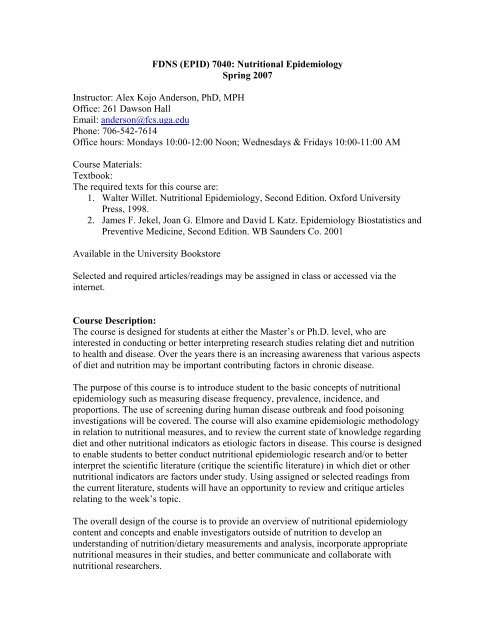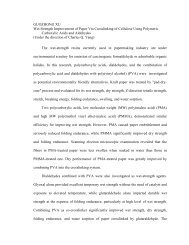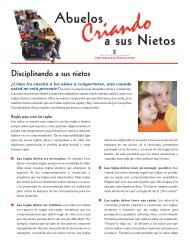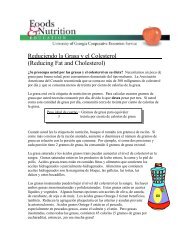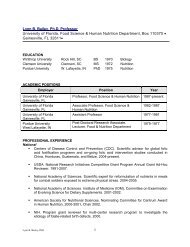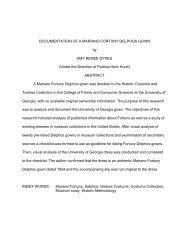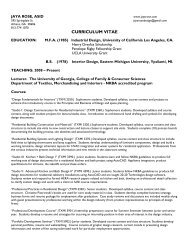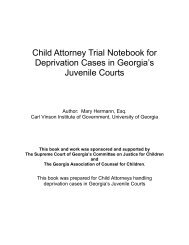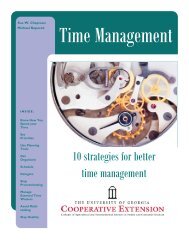FDNS(EPID) 7040: Nutritional Epidemiology
FDNS(EPID) 7040: Nutritional Epidemiology
FDNS(EPID) 7040: Nutritional Epidemiology
Create successful ePaper yourself
Turn your PDF publications into a flip-book with our unique Google optimized e-Paper software.
<strong>FDNS</strong> (<strong>EPID</strong>) <strong>7040</strong>: <strong>Nutritional</strong> <strong>Epidemiology</strong><br />
Spring 2007<br />
Instructor: Alex Kojo Anderson, PhD, MPH<br />
Office: 261 Dawson Hall<br />
Email: anderson@fcs.uga.edu<br />
Phone: 706-542-7614<br />
Office hours: Mondays 10:00-12:00 Noon; Wednesdays & Fridays 10:00-11:00 AM<br />
Course Materials:<br />
Textbook:<br />
The required texts for this course are:<br />
1. Walter Willet. <strong>Nutritional</strong> <strong>Epidemiology</strong>, Second Edition. Oxford University<br />
Press, 1998.<br />
2. James F. Jekel, Joan G. Elmore and David L Katz. <strong>Epidemiology</strong> Biostatistics and<br />
Preventive Medicine, Second Edition. WB Saunders Co. 2001<br />
Available in the University Bookstore<br />
Selected and required articles/readings may be assigned in class or accessed via the<br />
internet.<br />
Course Description:<br />
The course is designed for students at either the Master’s or Ph.D. level, who are<br />
interested in conducting or better interpreting research studies relating diet and nutrition<br />
to health and disease. Over the years there is an increasing awareness that various aspects<br />
of diet and nutrition may be important contributing factors in chronic disease.<br />
The purpose of this course is to introduce student to the basic concepts of nutritional<br />
epidemiology such as measuring disease frequency, prevalence, incidence, and<br />
proportions. The use of screening during human disease outbreak and food poisoning<br />
investigations will be covered. The course will also examine epidemiologic methodology<br />
in relation to nutritional measures, and to review the current state of knowledge regarding<br />
diet and other nutritional indicators as etiologic factors in disease. This course is designed<br />
to enable students to better conduct nutritional epidemiologic research and/or to better<br />
interpret the scientific literature (critique the scientific literature) in which diet or other<br />
nutritional indicators are factors under study. Using assigned or selected readings from<br />
the current literature, students will have an opportunity to review and critique articles<br />
relating to the week’s topic.<br />
The overall design of the course is to provide an overview of nutritional epidemiology<br />
content and concepts and enable investigators outside of nutrition to develop an<br />
understanding of nutrition/dietary measurements and analysis, incorporate appropriate<br />
nutritional measures in their studies, and better communicate and collaborate with<br />
nutritional researchers.
Course Goals and Objectives:<br />
The objective of the course is to provide the student with familiarity with the design,<br />
conduct, analyses, and interpretation of epidemiologic studies related to nutrition. At the<br />
end of this course students will be able to:<br />
a) Use basic terms and concept of epidemiology such frequency, prevalence,<br />
incidence, proportions, and measures of effect and association (odds ratio,<br />
relative risk etc).<br />
b) Select the appropriate screening tool for screening nutrition emergencies and<br />
human health outbreak investigations including exposure and outcome<br />
measurements (diet and disease).<br />
c) Select the most appropriate epidemiologic study design and study population<br />
for research evaluating the relationship between nutrition and health.<br />
d) Identify the strengths and limitations of each study design currently available<br />
for various nutrition-related research questions, and understand the<br />
implications of the limitations of each method on study results in relation to<br />
specific nutrition research questions.<br />
e) Describe the data analysis and interpretation issues of special importance in<br />
nutritional epidemiology studies<br />
Intended Audience<br />
This course is intended for graduate students with an interest in gaining an understanding<br />
of how epidemiologic studies of diet and chronic disease are conducted. Thus, it may be<br />
most appealing to students who foresee themselves involved in epidemiologic research as<br />
focus a focus of activity such as community, international and public health nutrition<br />
research. Although students are not required to have a strong nutrition background, it<br />
would be helpful to have a strong interest in these areas.<br />
Method of Instruction<br />
The primary method of instruction is through lectures and discussions including student<br />
presentations on selected areas of interest. Active participation in the classroom<br />
discussion is important and encouraged.<br />
Assessments and Grading:<br />
There will be a total of 3 written examinations for credit, 2 interim exams and one final<br />
exam. The 2 written interim examinations will be completed during scheduled class<br />
times. The interim exams will not be cumulative. The final exam will be cumulative.<br />
There will also be 3 take-home assignments for credit (including one critique). Students<br />
will also be required to take the CDC online investigation training on “Botulism in<br />
Argentina.” This case study investigation can be found at the following website:<br />
http://www2a.cdc.gov/phtnonline/ Please go to the website and locate the Botulism in<br />
Argentina case study. Follow the instructions and directions to download the case study.<br />
The case study has to be done online, which means you should have internet access to<br />
complete this case study. During the registration to take the case study please remember<br />
to register for CME credits this will enable you to print a certificate to be submitted to me
at the end of the case study. Please make sure you print your score at the end of each<br />
session of the case study to be attached to the certificate for submission. Class<br />
participation is an integral part of this course and will be graded. Failure to write any of<br />
the exams or submit any of the homework assignments and project will result in a grade<br />
of “I” at the end of the semester, irrespective of the students overall performance in the<br />
class. Each student is expected to abide by all due dates for submission of homework<br />
assignments and projects. Each day after the due date of submission of homework<br />
assignment will attract a penalty of 5 points.<br />
Total Grade:<br />
Final Exam worth 25% of final grade<br />
2 interim exams @ 15% of final grade per exam = 30% of final grade<br />
2 take home assignments @ 10% of final grade per assignment = 20% of final grade<br />
Critique of the literature worth 10% of final grade<br />
Case Study worth 10% of final grade<br />
Class participation in small group and large class discussion = 5% of final grade.<br />
Grades and Standards<br />
A = (94 – 100)<br />
A - = (90 – 93.9)<br />
B + = (87 – 89.9)<br />
B = (83 – 86.9)<br />
B - = (80 – 82.9)<br />
C + = (77 – 79.9)<br />
C = (73 – 76.9)<br />
C - = (70 – 72.9)<br />
D = (60 – 69.9)<br />
F < 60<br />
Grading Scheme<br />
Class Test 1 = 30 points<br />
Class Test 2 = 30 points<br />
Take Home Assignment # 1 = 20 points<br />
Take Home Assignment # 2 = 20 points<br />
Critique of the Literature = 20 points<br />
Case Study = 20 points<br />
Final Exam = 50 points<br />
Class Participation/Attendance = 10 points
Class Outline/Schedule<br />
Date Topics Reading/Assignments<br />
01/09 Overview<br />
Introduction to the class and general housekeeping<br />
01/11 <strong>Nutritional</strong> <strong>Epidemiology</strong> – Definitions and terms used in<br />
<strong>Nutritional</strong> <strong>Epidemiology</strong><br />
Chapter 1: Willet<br />
Chapters 1 & 4: Jekel<br />
01/16 Measures of Association Chapters 2 & 6: Jekel<br />
01/18 Study Design - Cross sectional and ecological studies Chapter 1: Willet<br />
01/23 Discussion of cross sectional ecological studies in<br />
nutritional epidemiology<br />
Chapter 5: Jekel<br />
Assignment #1 due<br />
01/25 Case Control Studies Chapter 5: Jekel<br />
01/30 Discussion of Case Control Studies in nutritional<br />
epidemiology<br />
02/01 Class Test 1<br />
02/06 Cohort Studies Chapter 5: Jekel<br />
02/08 Controlled trials and Behavioral Intervention Studies Chapter 5: Jekel<br />
02/13 Discussion of Cohort and Controlled Trials in nutritional<br />
epidemiology<br />
02/15 Screening Tests and Disease Prevention:<br />
Chapter 7 & 17: Jekel<br />
Primary, Secondary and Tertiary Prevention<br />
Assignment #2 due<br />
02/20 Interpretation of Screening Results:<br />
Chapter 6: Willet<br />
Reliability and Validity<br />
Chapter 10: Jekel<br />
02/22 Confounding<br />
Critiquing of the Scientific Literature<br />
Chapter 4: Jekel<br />
02/27 Class Test 2<br />
03/01 Exposure Assessment: Recalls, Records, FFQs Chapters 4 & 5: Willet<br />
Critique Assignment Due<br />
03/06 BMI and Mortality, Obesity (Dr. Lee)<br />
03/08 Investigation of Foodborne Illness (Botulism in<br />
Argentina)<br />
03/13<br />
03/15<br />
SPRING BREAK – No Classes<br />
03/20 Exposure Assessment III: Biomarkers; physical activity Botulism in Argentina<br />
Assignment Due<br />
03/22 Discussion of Assessment Studies<br />
03/27 Data Analysis & Interpretation Issues Chapter 13: Willet<br />
Chapter 9: Jekel<br />
03/29 Data Analysis & Interpretation Issues Chapters 10-13: Jekel<br />
04/03 Maternal and Child Nutrition/Health<br />
Preventing Infant Mortality<br />
Chapter 18: Willet<br />
04/05 Maternal and Child Nutrition/Health<br />
Preventing Infant Mortality<br />
To be assigned<br />
04/10 Obesity and Health To be assigned<br />
04/12 Obesity and Health To be assigned<br />
04/17 Chronic Disease <strong>Epidemiology</strong> To be assigned<br />
04/19 Chronic Disease <strong>Epidemiology</strong> To be assigned<br />
04/24 Special Topics II: Food group analysis: Dietary<br />
supplements & nutraceuticals<br />
To be assigned<br />
04/26<br />
FINALS<br />
Course Review and Evaluation
Attendance Policy<br />
According to UGA policy on class attendance, students are expected to attend classes<br />
regularly. A student who incurs an excess number of absences (more than 3 in this class)<br />
may be withdrawn from a class at the discretion of the instructor.<br />
Students are highly encouraged to attend all class periods. There are many benefits from<br />
attending class. Benefits include in-depth explanation of required readings by the<br />
instructor; opportunity for students to ask questions over assigned topics, readings,<br />
projects/assignments, exams, and other areas of student interest; opportunity to discuss<br />
information not in the required readings; explanation of the answers on exam; and<br />
opportunity for the instructor to get to know students better so that the instructor can<br />
write letters of recommendation for internships, practicum, scholarships, jobs and other<br />
reasons.<br />
In some cases, absences can be excused. Excuses for anticipated absences must be<br />
cleared with the instructor before the absence (send an email to the instructor explaining<br />
the situation). Excused absences include, but are not limited to absence for court<br />
appearances, university business, verified illness, and certain family emergencies.<br />
Written, dated documentation must be presented for each excused absence from an<br />
officer of the court, college official, or physician. Students are hereby reminded that<br />
attendance will be taken during each class.


